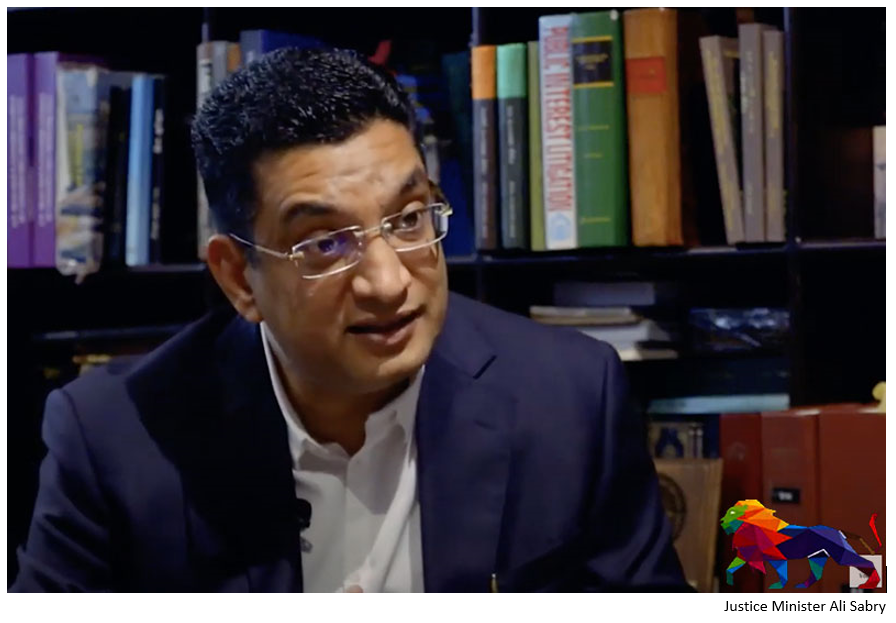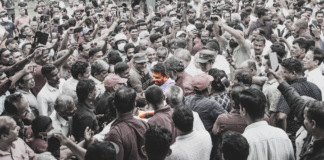Sri Lanka is faced with multiple crises virtually on all fronts, and the crippling foreign currency crunch is widely thought to be the worst. Available foreign currency reserves are said to be barely sufficient for two more weeks, and the country will find itself in the same predicament as Lebanon, come next February, according to independent economists. The danger of a sovereign default looms large on the horizon although the government is trying to wish it away. If what is feared comes to pass, the country will be done for, and things will fall apart both economically and politically. The government’s steamroller majority will be of no use in bringing order out of chaos in such an eventuality.
It is doubtful whether any of the ruling party politicians has realized the danger of what is playing out on the economic front. Ministers are going overseas in droves on vacation, according to media reports. Prominent among them is Finance Minister Basil Rajapaksa, whose presence is required here more than anyone else’s at this juncture. Or, it may even be that they are convinced that the situation is beyond their control and are enjoying themselves because they are simply incapable of doing anything about it.
Mass disillusionment
The biggest problem Sri Lanka is faced with is the adverse psychological impact of decades of misrule on the polity, whose disillusionment with mainstream politics and political institutions is palpable as a content analysis of social media posts will reveal.
Justice Minister Ali Sabry himself is fed up with the system. He has gone on record saying he will never be an MP again, and after serving his current term, he will return to the legal profession. What does his statement signify? The disillusionment of the public with the political and electoral processes is not of recent origin, but it has certainly reached the tipping point, and what it will lead to is anybody’s guess.
Madness has been defined as doing the same thing over and over again, expecting a different result. This is exactly what Sri Lankans have been doing all these years; all their experiments have unsurprisingly been in vain. All the self-proclaimed messiahs have failed them under successive governments.
In the 1970s, Sri Lanka’s experiment with its brand of socialism failed because the rulers of the day were in a mighty hurry, and paid no heed to the many hardships their extreme actions caused to the general public. What the country gained on the economic front could not be sustained as public opinion turned against the SLFP-led United Front government, and voted it out in 1977, when the irate masses rejected ‘socialism’ lock, stock and barrel. The traditional leftist parties have never recovered from that electoral shock, and it took 17 long years for the SLFP to make a comeback, that too as a coalition with a razor-thin majority in the parliament.
‘Righteousness’ loses meaning
In 1977, the country’s experiment with unbridled capitalism began. The economy was opened up recklessly and all gains under the previous regime were sacrificed on the altar of economic liberalization. Sri Lanka, no doubt, had to adapt itself to the global economic trends, but the UNP government overdid things, and its ill-conceived policies led to the ruination of the local industries, state institutions like the Paddy Marketing Board, the Ceylon Transport Board, and paved the way for the foreign aid culture, which has been the bane of the country’s economy.
At the 1977 general election, the late J. R. Jayewardene sought a mandate from the people to bring about a Righteous Society, or Dhamista Samajaya, of all things, but his rule and that of his successor, R. Premadasa, turned out to be the very antithesis of righteousness. As a result, the word, righteousness, has taken on an extremely negative connotation in the Sri Lankan context, political or even otherwise, so much so that it has become synonymous with the violent suppression of political dissent and worker’s rights, the abuse of power, election violence and rigging, bribery and corruption, state patronage for underworld figures, attacks on democracy and judicial independence, cronyism, nepotism, the culture of impunity and the sale of state assets for a song.
False dawn in 1994
The SLFP under Chandrika Kumaratunga’s leadership infused some hope into the polity fed up with politics, and promised to usher in a new era free from dooshanaya and beeshanaya or corruption and fear. The new regime chose to continue with the UNP’s economic policies, and became no better than its predecessor. People who pinned their hopes on Chandrika belonged to all ethnic communities, and they became disillusioned before long, with the evils such as political violence, election malpractices, bribery and corruption and impunity raising their ugly heads.
One of the worst elections in Sri Lanka took place under the Kumaratunga presidency. In the run-up to the 1999 North-Western Provincial Council elections, UNP supporters including women were rounded up, beaten, stripped naked and paraded on streets by the SLFP goons, in Kurunegala. On the day of polling, ballot boxes were stuffed while the police looked on. Journalists were killed and newspaper organizations attacked. The people’s faith in the electoral process suffered a severe erosion.
Peacemaking becomes a mockery
The UNP-led UNF government came to power in 2001 promising to find a peaceful solution to the war, and bring about national reconciliation, but what it did instead was total capitulation to the LTTE, which abused a fragile truce to prepare itself for Eelam War II. Direct attacks on democracy did not happen unlike in the past, but those who abhorred the LTTE’s violence, lost faith in a negotiated settlement, and switched their allegiance to the politicians who promised a military end to the war.
The UNF administration entered into disastrous agreements with foreign powers like the one on the Trincomalee oil tank farm, and compromised national security, thus allowing its political rivals to capture power again.
Nationalism and patriotism as a facade
The leaders of the Mahinda Rajapaksa government (2010-2015) after defeating the LTTE labored under the delusion that they could do anything and get away with it by flaunting what they had the public believe to be nationalism/patriotism. But the people got fed up with the then rulers’ brand of patriotism, in the name of which many crimes were committed, and defeated that administration, which had become a threat to democracy and was notorious for bribery and corruption, abuse of power, political violence and nepotism.
Someone has likened the fate that befell the country under the previous Rajapaksa government to a damsel in distress being raped by the very person who saves her.
Good governance, a pie in the sky
The Sirisena-Wickremesinghe government, which came to power in 2015 made a mockery of good governance, which they promised to usher in. Soon after the formation of that government, the Treasury bond scams were committed, and many other rackets followed. State assets, including the Hambantota Port, were divested, and more foreign loans obtained. Finally, the Easter Sunday bomb attacks in 2019 ruined the yahapalana government’s chances of winning an election.
President Maithripala Sirisena and Prime Minister Ranil Wickremesinghe severally and jointly did the greatest disservice to political reconciliation and made the people dread the concept of national government with their joint administration plunging the country into utter chaos.
Technocracy becomes a joke
A ray of hope appeared in 2019, when the leaders of the current dispensation promised meritocracy, and a group of professionals came together, under the Viyathmaga banner, promising to make a difference in politics. Their choice for the presidency was former Defense Secretary Gotabaya Rajapaksa, who was considered a technocrat.
But that hope too has been dashed, and the people are disillusioned even more, with the Viyathmaga members having failed to make good on their promise to bring about meritocracy. Worse, Justice Minister Sabry, who played a key role in bringing this government to power wants to leave politics for good as he is not happy with the situation.
What next?
Sri Lanka is bound to overcome the current economic crisis sooner or later, but its biggest problem will be to restore the faith of the public in political and electoral processes. The people have grown so cynical and frustrated over the years that it is doubtful whether there is any room left for hope and optimism. All those in mainstream politics have taken turns to let them down badly since 1948. It is no surprise that the youth are emigrating in their thousands.
We will be lucky if the people’s disillusionment and frustration do not find expression in uprisings like the Arab Spring.





